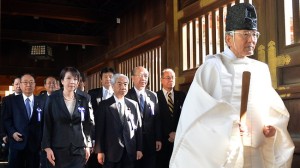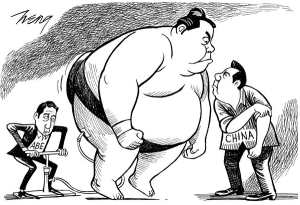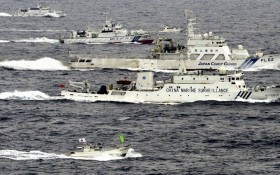Much is made in the international media of the way North Korea ignites military tensions with Groundhog Day-like precision. It does this, of course, by threatening to nuke not just wary neighbors like South Korea and Japan, but even the United States.
 By contrast, relatively little is made of the way Japan ignites similar tensions with equal precision. It does this by having its leaders make annual pilgrimages to the Yasukuni Shrine, where they pay homage to war dead from World War II, including notorious war criminals.
By contrast, relatively little is made of the way Japan ignites similar tensions with equal precision. It does this by having its leaders make annual pilgrimages to the Yasukuni Shrine, where they pay homage to war dead from World War II, including notorious war criminals.
These pilgrimages invariably incite militant outrage in China and South Korea – countries Japan invaded and/or occupied during that war and whose leaders decry these pilgrimages as a direct affront to their war dead.
No matter in what capacity or form Japanese leaders visit Yasukuni Shrine, in essence it is an attempt to deny Japan’s history of aggression. Only by facing up to and repenting for its history of aggression can Japan create the future, and truly develop friendly and cooperative relations with its neighbors.
(The Australian, April 23, 2013)
But just as I have commented over the years on the mostly rhetorical skirmishes North Korea’s bellicose threats have instigated, I have done the same with respect to Japan’s provocative pilgrimages:
In conversation with a European friend about this international spat, she expressed bewilderment that China and South Korea would take offense at a Japanese prime minister visiting a shrine to his fallen comrades in his own country. In response to her bewilderment, I merely posed the following:
How do you suppose the Poles, French, and British would feel if German chancellors made a similar show of annual pilgrimages to a shrine to Germany’s war dead, including Adolf Hitler and other Nazi war criminals? Surely you are aware that the Japanese committed atrocities against the Chinese and Koreans that were very much in kind to those the Germans committed against the Jews and other Europeans during World War II, no?
(“Japan Gives Finger to Aggrieved Neighbors,” The iPINIONS Journal, October 18, 2005)
 Yet, no matter how justified China and South Korea may be in their outrage, there has never been any real fear that the spat over Japan’s war shrine could escalate into full-scale war. By contrast, there has been abiding fear that the spat over North Korea’s nuclear program could mushroom into thermo-nuclear war.
Yet, no matter how justified China and South Korea may be in their outrage, there has never been any real fear that the spat over Japan’s war shrine could escalate into full-scale war. By contrast, there has been abiding fear that the spat over North Korea’s nuclear program could mushroom into thermo-nuclear war.
This is why it is so ironic that the increasingly bellicose rhetoric China and Japan have been hurling at each other over ownership of the disputed Senkaku/Diaoyu Islands is inciting even more fear than the spat over North Korea’s nukes. Got that?
Addressing Japan’s parliament, [Prime Minister Shinzo] Abe stated, ‘We would take decisive action against any attempt to enter territorial waters and to land’ on the uninhabited islands, adding ‘it would be natural for us to expel by force the Chinese if they were to make a landing.’
(Japan Daily Press, August 23, 2013)
 Even more ironic is that, on the one hand, Japan is urging China to keep North Korea’s nuclear brinkmanship in check while, on the other hand, it is urging China to keep its own territorial brinkmanship in check. And the latter is especially noteworthy given the way China has been trespassing what Japan considers to be its territorial waters surrounding these disputed islands — as it did with an armada of eight patrol ships just yesterday.
Even more ironic is that, on the one hand, Japan is urging China to keep North Korea’s nuclear brinkmanship in check while, on the other hand, it is urging China to keep its own territorial brinkmanship in check. And the latter is especially noteworthy given the way China has been trespassing what Japan considers to be its territorial waters surrounding these disputed islands — as it did with an armada of eight patrol ships just yesterday.
It is extremely deplorable and unacceptable that Chinese government ships are repeatedly entering Japanese territorial waters. We have made a firm protest against China both in Beijing and Tokyo.
(Japan’s Chief Cabinet Secretary Yoshihide Suga, Japan Daily Press, April 23, 2013)
Nonetheless, I’m on record declaring this territorial spat to be full of sound and fury, signifying … little:
War between China and Japan over the Senkaku Islands would make the war between Argentina and Britain over the Falkland Islands seem like a barroom brawl between mindless drunks. Not least because the United States would be compelled to honor its treaty obligations to defend Japan…
[But] notwithstanding the mob-like passions of their respective nationalists, I’m sure Chinese and Japanese leaders alike are mindful of the folly of fighting a war over desolate islands that could only end in a pyrrhic victory at best.
(“China and Japan in Falklands-like Dispute,” The iPINIONS Journal, August 23, 2012)
Of course, I am all too mindful that, as Barbara Tuchman chronicled in The March of Folly: From Troy to Vietnam, countries have often fought wars over much less. So stay tuned….
Related commentaries:
Japan gives finger…
China and Japan…